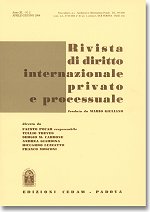Second Issue of 2015’s Rivista di diritto internazionale privato e processuale
(I am grateful to Prof. Francesca Villata – University of Milan – for the following presentation of the latest issue of the RDIPP)
 The second issue of 2015 of the Rivista di diritto internazionale privato e processuale (RDIPP, published by CEDAM) was just released. It features one article and two comments.
The second issue of 2015 of the Rivista di diritto internazionale privato e processuale (RDIPP, published by CEDAM) was just released. It features one article and two comments.
In her article Costanza Honorati, Professor at the University of Milano-Bicocca, examines the issue of child abduction under the Brussels IIa Regulation in “La prassi italiana sul ritorno del minore sottratto ai sensi dell’art. 11 par. 8 del regolamento Bruxelles II-bis” (Italian Practice on the Return of the Abducted Child Pursuant to Art. 11(8) of the Brussels IIa Regulation; in Italian).
The vast majority of return applications filed with the Italian Central Authority under the 1980 Hague Convention on the civil aspects of international child abduction concern children who are habitually resident in Italy and have been wrongfully removed to a foreign State (so-called “outgoing cases”). Therefore, it is not surprising that some of the foreign decisions refusing to return a child on the grounds of Article 13(1)b of the Convention were challenged before Italian courts with the special procedure provided under Article 11(8) of the Brussels IIa Regulation. Indeed, Italy stands out as one of the very few EU States that provide some case law on Article 11(8) of the Brussels IIa Regulation. However, it does come as a surprise that in most of these cases Italian courts, after a thorough analysis of the facts, including what was produced in the foreign proceedings, have confirmed the foreign non-return order and dismissed the request for return. In fact, only in a small number of cases the court has found the foreign decision to be ill-founded and has adopted a «trumping» return order. The present article aims at reviewing and analysing both groups of decisions, showing, on one side, how the time factor is often crucial and rightly kept into consideration by the court of habitual residence when deciding for non-return. On the other side, time is of the essence also in cases where the court of habitual residence orders for the children to be returned. When such order is not complied with or enforced in a very short time, it is here assumed that best interest of the child would call for a subsequent review of the decision rendered by the court of the place of the child’s habitual residence.
In addition to the foregoing, the following comments are also featured:
Elisabetta Bergamini, Associate Professor at the University of Udine, discusses status of children in a private international law perspective in “Problemi di diritto internazionale privato collegati alla riforma dello status di figlio e questioni aperte” (Questions of Private International Law Related to the Status of Children and Open Issues; in Italian).
This paper examines the Italian law reforming the status of children (Law No 219/2012), which finally abolished all discriminations between children born in and out of wedlock, and the consequences such abolishment entails at a private international law level. The first part of the paper analyses the reform, its principles and the problems related to the definition of the rules on the unity of the status of the child as “overriding mandatory provisions”. The second part tackles some of the most relevant unsolved problems related to children status, such as the establishment of the parental link in case of medically assisted reproduction, the regime applicable to surrogate motherhood, and the legal vacuums affecting children of same-sex couples. In this regard, particular attention is paid to the Italian case-law, as well as its relationship with the ECtHR and the EU case-law, and to the possible solutions to the non-recognition of the personal status acquired in a foreign country.
Silvia Marino, Researcher at the University of Insubria, tackles choice-of-court agreements in parental responsibility matters in “La portata della proroga del foro nelle controversie sulla responsabilità genitoriale” (The Scope of Choice-of-Court Agreements in Disputes over Parental Responsibility; in Italian).
This article examines two recent judgments of the European Court of Justice concerning choice of forum in matters related to parental responsibility. These decisions offer the opportunity to reflect on the pre-conditions for the validity of the choice of forum clause, i.e. the agreement, the proximity, the interest of the child and the connection with another proceeding, and the relationships between different bases of jurisdiction (habitual residence and forum non conveniens). Analysing the peculiar facts of the cases and the clarifications provided by the ECJ, the article tackles those pre-conditions from a practical and concrete standpoint with a view to understanding when and how the different bases of jurisdiction can be used. Some final considerations are devoted to the concrete range of the choice of the parties.
Indexes and archives of RDIPP since its establishment (1965) are available on the website of the Rivista di diritto internazionale privato e processuale. This issue is available for download on the publisher’s website.


